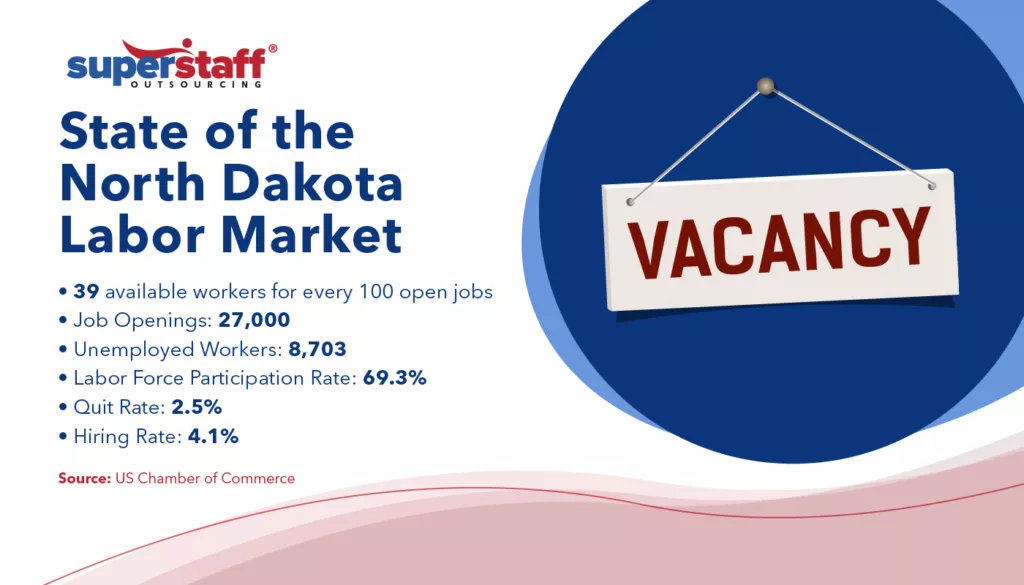
While the pandemic may be behind us, its lingering impact on the labor market still hounds the country.
The Great Resignation, The Great Reshuffle, and Quiet Quitting continue to drive staff churn, with 20% of HR leaders citing employee retention as their biggest concern, closely followed by recruiting at 14%.
The talent crunch is severely felt across the country, with North Dakota among the states with the most severe shortages.
As automation, new technology, and artificial intelligence continue to reshape the business landscape, organizations must adapt and innovate to bridge the talent gap.
How can businesses navigate this harsh climate and secure success in the face of evolving job market dynamics? Philippines outsourcing offers strategic, cost-efficient, and future-proof solutions to drive your workforce growth.
State of the North Dakota Labor Market

With the country’s second-lowest unemployment rate, North Dakota faces a massive gap between the talent pipeline and the increasing demand. There are only 39 available workers for every 100 job openings, so even if the state can find jobs for all its eligible residents, 61% of its vacancies will still need to be filled.
The labor shortage is not confined to urban areas in the state either. Since most of the state’s working-age population resides in cities, rural regions, such as northeast North Dakota, are experiencing even more difficulties in hiring.
Recognizing the severity of the shortage, North Dakota has already passed a bill to address workforce gaps by leveraging legal immigration to fill vacant positions.
While this step is a positive development, it is only the beginning of a complex process to tackle long-standing immigration issues. The state needs to urgently plug the gap by leveraging innovative and sustainable solutions that would drive business growth and resilience.
5 In-Demand Jobs That Outsourcing to the Philippines Can Help Fill

With North Dakota businesses struggling to find and retain skilled workers, the need for outsourcing to expand the talent pool in the area has never been more pressing.
How can the outsourcing industry help? Let’s explore five in-demand jobs in the state that Philippine call centers and BPOs can help fill.
Customer Service Representatives
COVID-19 significantly changed the e-commerce landscape.
With lockdowns and social distancing measures in place, people turned to online shopping as a safer and more convenient alternative to traditional brick-and-mortar stores, leading to a surge in online sales and the overall expansion of the digital marketplace.
Large and small businesses were forced to adapt to meet the increasing demand for online shopping. Those already with a robust e-commerce infrastructure thrived better. In contrast, others had to rapidly enhance their online presence to keep up, resulting in a broader range of online services and products.
Due to the sudden surge in online sales, stores needed help to keep pace with the demand for quality customer service (CS). More Americans have become vocal about their discontent, with 74% of Americans reported encountering CS issues in the past year – more than a two-fold increase in problems since 1976. And they’re taking out their rage on various online platforms such as TikTok, with 43% having resorted to yelling or raising their voice to express frustration about their most serious problem, compared to only 35% in 2015.
How can businesses keep their customers satisfied and their online reputations spotless in a market filled with impressionable online shoppers?
Considering the challenges posed by the US labor shortage, outsourcing customer support can be a strategic solution for businesses aiming to provide an exceptional customer experience while optimizing resources.
Philippine BPO firms are CS experts handling 24/7 omnichannel customer support functions, including phone, email, and chat support. They have dedicated teams trained to handle complex customer inquiries, resolve issues, and provide a satisfactory customer experience.
The call center industry allows businesses to tap into the BPO firm’s established infrastructure, technology, and skilled workforce, without the need to build and maintain their own CS department.
Virtual Assistants
As a business owner, it’s no secret that you dedicate time and energy to the most critical aspects of your business. Rather than getting bogged down by time-consuming administrative tasks like email management, appointment scheduling, and travel arrangement, you should focus on things that truly impact the growth and success of your venture.
However, there’s one thing that’s wrong with this scenario. There is a growing shortage of administrative staff in the US. While the employment outlook for secretaries and administrative assistants is expected to drop 8% percent from 2021 to 2031, there is still a significant demand for these positions, with around 354,000 job openings projected each year for the next decade.
What do the numbers tell us? There are not enough local assistants to go around, and one simple yet effective remedy is looking offshore for global talent.
That’s where outsourcing comes into play.
Traditionally, we think of assistants as individuals physically present to support us with various tasks. Filipino virtual assistants (VAs) challenge this notion by offering exceptional remote assistance. By utilizing cutting-edge technology, virtual assistants can streamline workflows, enhance productivity, and offer personalized services tailored to individual needs.
They are typically multitasking masters who can perform a myriad of functions. They effortlessly handle administrative tasks, from managing calendars and scheduling appointments to answering queries and conducting research. Additionally, they can assist with organizing emails, generating reports, and even monitoring social media accounts. With their adaptability, virtual assistants save valuable time and free up resources for other critical activities.
Offloading repetitive and time-consuming tasks to virtual assistants significantly boost efficiency and productivity. With their ability to handle multiple responsibilities simultaneously, they excel in managing complex workflows.
Sales Representatives
With the evolution of consumer demand and the prevalence of online shopping, the need for sales representatives continues to rise.
Consumers are now the ones setting the bar for salespeople. They seek competence and value in the individuals they choose to engage with. Buyers want salespeople who can provide valuable insights, solve problems, and offer personalized solutions. This demand for highly competent sellers has created a scarcity in the labor market, as finding such individuals is challenging.
The growth of e-commerce has reshaped the sales representative labor market, emphasizing the importance of competence and value in sales engagements. To thrive in this changing landscape, businesses must adapt their sales approaches to meet buyer expectations and drive growth in the digital era.
However, one thing stands in the way of this growth curve: the growing staffing crisis in sales.
The current business landscape has presented significant challenges for sales leaders in retaining their sales reps and recruiting new talent. The booming economy has created a high demand for talent. Meanwhile, competition for skilled salespeople intensifies as businesses strive to capitalize on market opportunities.
Sadly, the consequences are enormous. Michael Smith, a Managing Director at Blue Ridge Partners, highlighted the challenges faced by fast-growing businesses in attractive markets, where their inability to attract and retain sales talent hinders their growth. Smith pointed out that in Silicon Valley, it is not uncommon for firms to lose 25% or more of their sales staff every quarter.
One strategy businesses can employ to navigate the talent crisis in sales is outsourcing. Organizations can tap into specialized external resources to meet their sales needs by contracting out sales functions to the Philippines. This approach allows businesses to access a pool of experienced sales professionals without the challenges of recruiting and retaining talent in-house.
Accountants, Bookkeepers, and Auditing Clerks
To paint a picture of the severity of the accounting shortage, we only need to look at how it impacted dozens of cities in the US.
S&P Global Ratings withdrew ratings for 64 local governments and utility systems last April because they failed to file financial information on time. Even the ratings of high-quality municipalities sunk, impacting their ability to fund priority projects for their communities. The underlying cause: overwhelming backlogs due to staffing issues in their auditing departments.
But what exactly is fuelling the talent shortage in finance and accounting? The answer lies in the country’s talent pipeline.
A 2021 trend report by the American Institute of Certified Public Accountants (AICPA) revealed a need for more certified public accountants, driven partly by a decreasing number of students graduating with accounting degrees. This decline in the pool of accounting graduates poses a significant challenge for organizations seeking qualified accounting professionals.
The rising retirement rates among accountants, coupled with a decline in the number of accounting graduates (2.8% at the bachelor’s level and 8.4% at the master’s level), contribute to a shortage of qualified professionals. Meanwhile, the demand for accountants continues to grow, driven by the need to fill vacant positions resulting from retirements and career transitions.
One way to avert the crisis is by tapping into a deeper pool of global accountant talent through accounting outsourcing. It allows businesses to tap into a vast network of skilled professionals. BPO companies often have a team of qualified accountants with diverse expertise, ensuring businesses have access to the suitable skill set for their specific accounting requirements.
Outsourcing accounting service and bookkeeping services empowers businesses to overcome the talent shortage, ensuring effective financial management and enabling them to thrive in a competitive business landscape.
Software Developers
While some tech giants are already enforcing layoffs, it’s an entirely different story for the rest of the industry.
Recruiting developers with the right skills remains a top challenge for tech firms in 2023, with more than a third of respondents (37.5%) anticipating difficulty finding skilled developers this year. Positions like Data Analytics Developer, IT Security Engineer, and DevOps Engineer are particularly challenging.
Tech firms can solve these hiring challenges by rethinking their recruitment strategies and leveraging innovative methods such as outsourcing. Embracing this new approach will enable organizations to attract and retain skilled developers, drive innovation, and position themselves for success in the evolving world of software development.
Outsourcing to software developers in the Philippines offers compelling advantages that can propel organizations toward success. Businesses can gain a competitive edge in today’s fast-paced digital landscape by leveraging a global talent pool, accessing specialized skills, reducing costs, accelerating time-to-market, and focusing on core competencies.
With careful planning and strategic implementation, outsourcing software development can be a powerful tool for organizations to achieve their goals and stay ahead in the ever-evolving technology landscape.
Why Outsource in the Philippines?
Dubbed the “Call Center Capital of the World,” the Philippines remains one of the top outsourcing destinations.
The country has experienced significant growth in its BPO industry, currently employing approximately 1.4 million workers and generating a revenue of US$29.1 billion as of 2022. In addition to call center outsourcing, the Philippines has emerged as a prominent market for other professional services, including accounting, IT, and healthcare.
One of the largest benefits of outsourcing to BPO companies in the Philippines is the country’s vast pool of highly skilled and proficient English-speaking professionals. The Philippine education system emphasizes English language training, producing a workforce fluent in both written and spoken English which makes communication with clients and customers from the US seamless.
The competitive labor cost also plays a massive advantage for outsourcing clients, making it a strategic option for businesses seeking to diversify talent at a reasonable price. The country’s Western culture also makes it easier for clients in North America and Europe. Furthermore, the Philippine government has implemented supportive policies, including tax incentives, infrastructure development, and the establishment of dedicated outsourcing zones and parks, to encourage the growth of the BPO market.
The Philippine time zone also allows for convenient, 24/7 support and collaboration with businesses in the Western hemisphere. Additionally, the country has significantly invested in its IT and telecommunications infrastructure, ensuring a reliable and high-speed internet connection that enables seamless communication, data transfer, and remote collaboration between outsourcing teams and their clients.
With a proven track record of offshoring and outsourcing success, the Philippines has fostered a skilled workforce well-versed in delivering quality outsourcing services.
Level Up Your Workforce With Philippine Outsourcing Companies
With a highly skilled workforce and a competitive cost advantage, outsourcing business processes to the Philippines can propel businesses to new heights despite the labor shortage.
Whether they’re looking for customer support, IT services, or back-office operations, partnering with a reputable outsourcing provider in the Philippines can help you access top-notch talent for maximum efficiency. By partnering with a trusted BPO firm such as SuperStaff, you can grow your workforce and position your business for success in the post-pandemic era.
Explore the opportunities of Philippine outsourcing and take the first step towards future-proofing your operations. Contact us today to learn how to overcome the ongoing War for Talent challenges with a Filipino call center.






